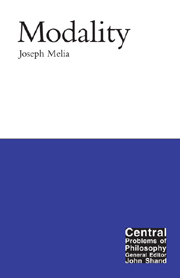7 - Possible worlds as sets of sentences
Summary
In this chapter we examine the view that possible worlds are essentially sets of sentences. We call this position the linguistic theory. Unlike the quiet moderate realist, the linguistic theorist has something to say about representation, about what it is for a proposition to be true at a world. Propositions are true at worlds in much the same way as they are true at books: by being implied by the book. Indeed, linguistic theorists may even define the phrase “true at w”. In this way, the linguistic theorist hopes to avoid the unnatural and magical primitives of the quiet moderate realist. The main problem facing the linguistic theorist is generating enough books to represent all the possibilities that we pre-theoretically wish to accept. The linguistic theorist will need a rich and flexible world-making language if he is to have any hope of doing this.
Accepting a linguistic theory may not be the only way to generate a moderate ontology containing possible worlds without taking “true at w” as a primitive. One might develop the idea that worlds represent in the same way that a map represents; namely, by sharing some kind of structure with that which is represented. Unfortunately, this idea quickly leads to trouble: a map represents by sharing similar properties to the land it represents. We need possible worlds according to which there are talking donkeys and if the worlds do this by containing something that shares similar properties to a talking donkey then the position begins to look like nothing more than extreme realism.
- Type
- Chapter
- Information
- Modality , pp. 155 - 172Publisher: Acumen PublishingPrint publication year: 2003

